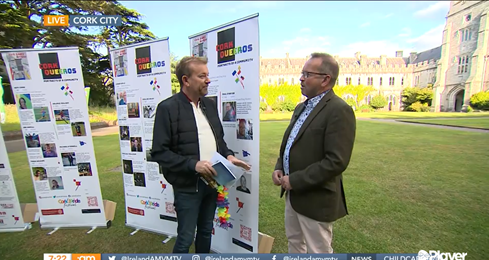- Home
- About the EDI Unit
- News & Events
- Publications
- Race Equality
- EDI Training Hub
- Equality Committee
- Gender Identity and Expression
- Sexual Violence and Harassment Framework
- Speak Out
- University of Sanctuary
- Athena SWAN
News & Events
LGBT Identities in Modern Ireland

UCC History's Dr Diarmuid Scully and Cork LGBT activist and author Orla Egan appeared in a Pride Month interview with Alan Hughes on Ireland AM (22nd June).
The interview was filmed on UCC's main campus. Diarmuid talked about his 2nd Year course 'LGBT Identities in Modern Ireland (1970s-2021): Sources, Contexts, Interpretations.' This is the only course on LGBT Irish history taught in any university on the island of Ireland. For an overview of the course, see below. In the Ireland AM interview, Orla discusses her creation of the Cork LGBT Archive: a vital resource for Diarmuid's students and anyone interested in Ireland's LGBT past and present. See the interview with Diarmuid and Orla at https://www.virginmediatelevision.ie/player/show/809/198416/0/Ireland-AM
LGBT Identities in Modern Ireland: Sources, Contexts, Interpretations (HI 2105 Case Studies in Research Skills, School of History, UCC. Dr Diarmuid Scully)
This is the first module on LGBT history to be taught in an Irish university. Dr Diarmuid Scully devised and introduced it in 2018, the 25th anniversary of the decriminalisation of homosexuality in the Republic. The study of LGBT Irish identities on the island of Ireland is an emergent research area with huge potential. Modern Ireland, North and South, has seen many transformations, but few as dramatic as the change in the perception and status of LGBT people.
The module explores the experiences of LGBT people and the shaping of LGBT identities in Ireland from the 1970s to 2022 via activists’ testimonies, LGBT rights promotional materials, media reports, personal accounts, and creative productions including songs, poems and the visual arts. These sources are located and analysed in their historical contexts. The module also asks how, and to what extent, Irish LGBT issues have been analysed by historians.
The module begins with a micro-history of the Irish LGBT experience via a study-tour of UCC campus (founded as Queen’s College Cork in 1845). This study-tour locates the 1970s-2022 experience in the longer history of Ireland under British rule and the earlier years of the Irish State. Much attention has rightly been paid to the impact of religious beliefs on the perception and treatment of LGBT people. But the campus - its buildings, monuments, and iconography – also illustrates how LGBT sexuality and legal discrimination against LGBT people were shaped by colonial agendas - British rule, laws, and moral codes - and their internalisation or rejection by Irish people in the post-1922 Free State and Republic. Recent changes to public spaces on campus – such as the Rainbow walkway and the official display of LGBT and Trans Pride flags – illustrate the transformative experience of the past several years in official and popular attitudes to LGBT people and identities.
In its discussion of the early years of Irish LGBT activism, the module explores media representations of LGBT people in the 1970s and 1980s and asks how activists and their allies tackled a culture of public and private silencing and shaming of LGBT people. It looks at the impact of criminal law on LGBT people in Ireland in the 1970s via a court case taken against two consenting adults in 1975. Particular attention is given to the homophobic murder of Declan Flynn in Fairview Park, Dublin in 1982, the ensuing court case, and its impact on public and private attitudes to LGBT people, including the first ever public protest march against violence against gay people and women (intersections between the LGBT rights and the women’s rights movement is a continuing theme).
The module also examines the impact of the teaching and practice of the Christian churches – in the Republic and Northern Ireland – on LGBT issues, and how the Churches, the State and the media have interacted with LGBT people. From the 1980s forward, the module looks at the impact of the AIDS crisis, traces the intensifying struggle for decriminalisation, acceptance, and ultimately equality, focussing on the Marriage Equality Referendum (2015) and its implications and legacies for LGBT activism and the lives of LGBT people in the 2020s.
